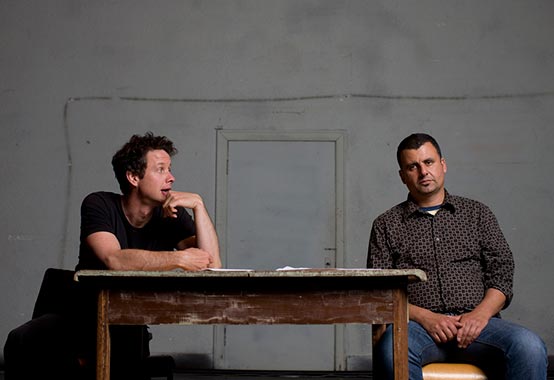Moral Combat

“Winners and Losers,” created by Marcus Youssef and James Long and playing at Washington’s Woolly Mammoth Theatre Company through November 22, is a tense and springy 100 minutes of aggression hidden under friendship–and vice versa. Youssef and Long act out their own longstanding, competitive friendship, getting rawer and more accusatory as the night wears on. I’m going to use “Marcus” for the guy I saw onstage, “Youssef” for the off-stage creator, but the two men’s comments on the emotional difficulties of doing this piece suggest that the stage personae are intentionally blurred with real life. Their often-hilarious attacks touch on race, class, besetting sins, fears, and paternal legacies; they wrestle and play Ping-Pong and bounce off the audience’s suggestions, mixing improv and rehearsed material in a kind of intersectionality decathlon.
They start out with a game in which they judge various people, places, and things to be “winners” or “losers.” Ticks, Occupy Wall Street, penguins, marijuana: thumbs up or thumbs down? Whoever comes up with a judgment first states it and makes his case, and then the other guy has to argue against him. That meant that on the night I saw the show Marcus had to scramble to argue, in response to an audience suggestion, that the University of Missouri was somehow a “winner.” He spluttered and floundered for a moment before throwing out a perfectly-timed, “They’ve got a hell of a football team! Winner.”
This opening segment establishes the friends’ characters and social positions. Marcus is a cautious type with an endearing, disarming smile. Jamie is a tense, ticking kind of guy, leaning forward intently, one foot sometimes tapping a little too loudly on the floor. Both of them are aware of the fault lines in their friendship, but for most of the evening they quickly swerve away from any subject that gets too heated. (Youssef and Long have impeccable timing.)
Marcus is the rich one, an Egyptian-Canadian who stands to inherit his distant father’s fortune. In the Mobius strip logic of anti-oppression politics, Marcus’s race gives him an advantage. Jamie is white, and from a much harsher background. I wondered if he was going to do that thing where white people who pride ourselves on being “street-smart” eventually sway into actual racism, and not only did he do that, he did it in a shaggy-dog story about that particular racial dynamic. This show doesn’t stray from acceptable theater-community progressivism, but it’s also very hard on its characters. Jamie’s attack on the concept of the 99 percent vs the 1 percent—it’s “very convenient solidarity” because it classes together actual poor people with wealthy but not that wealthy people, so the latter can run a movement ostensibly on behalf of the former—is one of the sharpest political critiques I’ve heard in a DC theater lately. And delivered in a compressed, triumphant tone that’s about Jamie as a person, thrilled to have found a wedge to use against Marcus.
The show is aware not only of the weaknesses in its leads’ shared worldview, but the human absurdities. Those absurdities often have to do with the post-Christian flavor of the Left. Religion itself is almost entirely absent here, showing up only in the rosaries Jamie kept finding in the dirty sheets at the industrial laundry where he used to work. (The show is full of startling little moments like that.) What remains of Christianity is a suspicion of power, a belief that the losers are morally purer, a belief that the humble will be exalted and the exalted humbled—if not in the eschaton, at least in this one night of improv comedy.
Sincerity, generosity, even humility itself all become competitive sports. Acknowledging that you don’t live up to your own standards can be a way to control the conversation, which Marcus uses a few times: If I admit this, will that make you stop talking about it? Morality is always a trump card (we live in a bizarrely moralistic age) and so if you want to win, you have to find a way for your position to be the more morally-pure one.
This came out most clearly in the segment on masturbation. Jamie (of course) proclaims himself the master of this art. He is the winner when judged on frequency but he also has the moral advantage that he will only use porn where the woman looks just like his wife. Marcus gets over his embarrassment enough to suggest that he should win, since his practices are more creative and he does not use any technological or pornographic enhancement. His self-abuse is artisanal and organic.
Honestly I feel bad for stepping on the joke here, but this is such a beautiful parody of our constant need to fill the moral vacuum. Where cultural or religious norms are no longer respected, other (often contradictory) moral norms will emerge, because we need some way to compare our moral prowess.
I’m making this sound like a self-serious event, when it’s really a cutting, suspenseful romp. By the end the tone has darkened significantly, as each friend says a lot of things he can’t unsay. The pace did slacken a bit, on my night, once the friends started battling openly rather than trying to conceal their real resentments. It wandered a bit in that final stretch. But overall—we’ve got to have a take-home judgment, right?—“Winners and Losers“ is a painfully funny show, the kind of comedy that provokes self-reflection as well as cathartic laughter. Don’t lose out—get your tickets now!
Comments